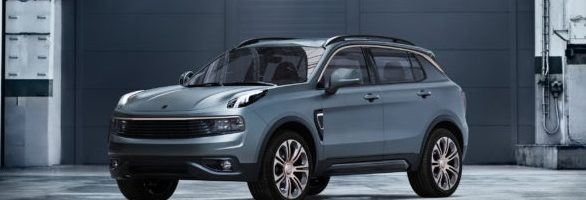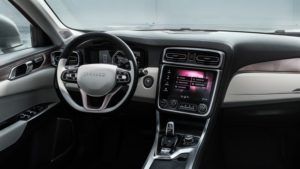Start your engines… via your smart phone.

Lynk & Co’s digital strategy aims to disrupt and revolutionize the car industry.
Lynk & Co is a new car brand born as a JV between Sweden’s Volvo and China’s Geely cars. It is releasing the hybrid “01 model” compact SUV in 2017 in China, Europe and the US1.
I hear you, “What? Another car brand? But it’s not even electric… or autonomous!” Well, if you had any of these thoughts, you’re not alone. Alain Visser, the CEO of Lynk & Co shares your opinion, “The world doesn’t need another car brand.”2 Then why on earth is Lynk building one from scratch? Because, like Apple with the iPhone, Lynk doesn’t believe they’re building a car but rather a fully connected source of mobility3.
 Now this all sounds very whimsical. Isn’t every car maker vigorously working to more seamlessly integrate their product with smart technology in a more connected world? So why is Lynk any different? Well, Lynk claims that they are tackling digital from the opposite direction. That is, rather than layering technology on top of a car platform, high-tech is being built at the very heart of its product design, making the user experience and interface highly customizable.
Now this all sounds very whimsical. Isn’t every car maker vigorously working to more seamlessly integrate their product with smart technology in a more connected world? So why is Lynk any different? Well, Lynk claims that they are tackling digital from the opposite direction. That is, rather than layering technology on top of a car platform, high-tech is being built at the very heart of its product design, making the user experience and interface highly customizable.
So what “high-tech” is Lynk & Co really offering and what does this mean for its business and operating model? There are a few different things that stand out:
- Full connectivity;
- Direct to consumer supply chain; and
- A sharing and monetization platform4.
Full connectivity: Lynk & Co cars will be permanently connected via 4G enabling sharing of data among themselves, including available parking spaces and the optimal speed to balance safely hitting green lights while preventing over acceleration and deceleration. Lynk will offer open API and the first dedicated app store for cars. Cars will not only have Apple CarPlay, MirrorLink, and Android Auto (in some markets), but also onboard telematics for permanent connection with the world via the Lynk & Co cloud.
Direct to consumers: Lynk & Co claims that as much as 25% of a car’s cost can be sunk into dealerships, so while it will have flagship stores, its primary distribution method will be direct (like Tesla). This will cut out the costly middlemen as well as provide a delivery and car servicing offering (pick-up, servicing and return) right to the customer’s door.
Sharing and monetization: Many argue that this is the largest differentiating factor. Lynk & Co will provide a platform for car owners to share and lease their vehicle to others when it would otherwise be unutilized. That is, owners will be able to provide access for others to use their car, for a fee if they wish, by providing digital keys through their iPhone.5
Hold on though, what about the elephant in the room? Such levels of connectivity and openness are great but won’t this provide the highest potential hacking vectors of any car to-date?
Well, yes.
In the connected world, greater convenience usually comes with the trade-off of greater vulnerability. Lynk & Co are confident that this won’t be an issue for them but then again, which company sets out to tell its potential customers that their product has the highest security risk?6
Ironically, Lynk & Co’s value proposition is to be reassuring and secure, but also perfectly integrated and synced up with our constantly connected lives7. It is positioning itself as an aspirational brand, slotting in between Geely’s budget vehicles and Volvo’s more premium line-up. In short, Lynk & Co wants to deliver connected, design-driven and very competitively priced cars where the perceived value is way beyond its actual price tag.
So where to from here?
Lynk & Co is planning a 02, 03 and other models to complete a full range of cars where electrification and self-driving capabilities will play an increasingly central role.4
Personally, I think these are both great ideas. However, I think the real value opportunity is in providing a highly customizable and connected set of vehicles suitable for single and multi-person mobility that owners can share and monetize… all within a truly safe and secure ecosystem – no biggy.
I think the jury is still out on this one – there are, and will continue to be, a plethora of skeptics. However, Lynk & Co certainly see an opportunity and are comfortable with divided opinions – “[we] would rather be something special to someone, than be bland to everyone.”4 I find their attitude quite refreshing, especially in an industry many deem outdated and inefficient. So I have to ask, “Should Lynk & Co push the automobile industry in this direction, even if the 01 model fails?”
I’d love to hear your opinion.
TV – xoxo.
Word count: 764
Footnotes
- Forbes, “Everything you need to know about Lynk & Co’s new business model to sell and share cars”, http://www.forbes.com/sites/tychodefeijter/2016/10/23/everything-you-need-to-know-about-lynk-cos-new-business-model-to-sell-and-share-cars/#44a954fe50a3, accessed 16 November 2016.
- The Verge, “Lynk & Co is a car company that’s refreshingly cynical about car companies”, http://www.theverge.com/2016/10/21/13356930/lynk-and-co-new-car-company-alain-visser, accessed 16 November 2016.
- Lynk & Co, “The car is not a car”, http://www.lynkco.com/en/car-and.html, accessed 16 November 2016.
- The Verge, “Lynk & Co is a new car brand that was ‘born digital’”, http://www.theverge.com/2016/ 10/19/13328674/lynk-and-co-geely-connected-car-volvo-launch-official, accessed 16 November 2018.
- The Boston Consulting Group, “What’s ahead for car sharing?”, https://www.bcgperspectives. com/content/articles/automotive-whats-ahead-car-sharing-new-mobility-its-impact-vehicle-sales/, accesses 16 November 2016.
- Strategy&, “Connected car report 2016: Opportunities, risk, and turmoil on the road to autonomous vehicles”, http://www.strategyand.pwc.com/reports/connected-car-2016-study, accessed 16 November 2016.
- Road and Track, “Lynk & Co wants to build a car you’ll love as much as your smartphone”, http://www.roadandtrack.com/new-cars/future-cars/a31258/lynk-co-first-chinese-car-in-america-usa/, accessed 16 November 2016.




Great post, Ty! I do agree that their attitude of aiming to be “special to someone” is refreshing. However, I have a hard time imagining that they will be successful. Especially if the 01 model fails, I’m not sure Lynk & Co will be able to push the auto industry in this direction. My biggest concern is whether or not consumers will trust a new brand name for big ticket items like automobiles with only incremental benefits. The full connectivity product differentiation factors seem like feature any existing car manufacturer could roll out easily. The direct to consumer model that Tesla implements was most interesting to me, but I think people still want trialability especially for such a large purchases. The sharing and monetization aspect is cool, but I think many carsharing apps (i.e. Turo and Getaround) already exists. I wonder how Lynk & Co will get users to use its own platform over existing platforms that offer a broader range of vehicle options.
Ty, real interesting find here! I am concerned about Lynk’s “edge”, as we say in FIN1. If I were to speculate on current car consumers’ preferences these days, I would guess that fuel economy maybe the top priority, followed by safety, and then perhaps performance specifications. I am wondering whether Lynk, and its value proposition, has the strength in these categories to compete. As mentioned, Lynk is seeking a niche market, and perhaps could be wonderful for the right buyer. Additionally, the technological proposals that you addressed could also be revolutionary in terms of driving and connected experience, and even improved utilization if people adopt the car sharing idea. These features alone might be enough to grab a percentage of the new car market. I am wondering too if the first generation 01 model might be disruptive in the market, and follow on models 02 and 03 could have increased success. Excited to find out.
Thanks for the post Ty. I have never heard of Lynk & Co (and maybe there is a reason). I read some skepticism between the lines regarding the potential for success of Lynk’s plan, and definitely agree with your lack of faith. Lynk is trying to enter a very crowded market and offering minimal differentiation, or better easy-to-replicate differentiation. Tesla is managing to move the needle in the auto maker industry (did not quite disrupt yet) by introducing a revolutionary feature. Lynk value proposition of a “connected” car does not look too revolutionary to justify the huge risk associated with capital investment to put together and scale up a car manufacturer.
All the three selling points (Full connectivity, Direct to consumer supply chain A sharing and monetization platform) are either existing or in the pipeline for big players (Uber, Tesla, pretty much all automakers). Additionally, car purchasing remains somewhat an emotional purchase, brands are extremely valued and with little brand recognition and no let-go-green hipe factor, it’ll be very hard for Lynk to succeed. Best of luck to them, I will stick to an unconnected V12 made in Maranello!
xoxo back!
Great post Ty – I think your last sentence keyed in on most interesting impact here – disruption.
Although, Lynk & Co is clearly concerned about the threat of hacking and cyber security (both very relevant) – Similar to Gregorio and others above – I have concerns about the market response. Is their plan is to have a successful rollout followed by acquisition by a major car company? Do they have several patents on their vehicle? What could make them continue to differentiate for the long term?
If successful I would be concerned about the competitors response. I feel that major car companies could simply create new lines of vehicle similar to Lynk & Co’s – and if the acquisition of Lynk & Co is more expensive than that internal investment they could be in trouble. Lynk & Co is taking all the risk as the major companies observe with an option to move in or just stay out. First mover advantage is certainly strong – but I would love to hear about the long term plan to disrupt the industry and stay differentiated from competition.
Great post, Ty. I have to say that I agree with your skepticism, I’m not sure that Lynk & Co is differentiating itself from other car brands in the right way. It feels like someone trying to claim they have reached a new frontier in nuclear power generation by re-designing the outside of a power plant. It feels slightly superficial, however when full electric capabilities come into action this may change…
What role do you think the government should play in providing data to car users? e.g. data on parking spaces or on congestion. Should car users be incentivised to take certain routes?
Extremely interesting post! Seems like they want it to be a “smartphone on wheels” but not sure how different their cars are from what’s already out there. In addition to differentiation, what are your thoughts on privacy and the collection of all this data? I would also be curious to see how auto insurance companies will also address this “car-sharing” idea.